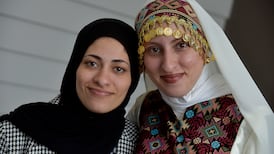The number of Traveller families sharing housing has doubled since 2011, as their ability to afford to rent in the private market is decreasing.
Some 963 Traveller families are now in shared housing, up from 451 families in 2011, according to the latest figures from the Department of Housing.
“Shared housing” refers to Traveller families moving two or three caravans into halting bays built to hold one, or families doubling up in caravans or houses.
The level of overcrowding in halting sites and housing schemes has worsened as the number of Travellers able to afford accommodation in the rental market has dropped.
In 2014, 2,672 Traveller families were estimated to be in rented housing, falling to 2,480 in 2015, and 2,222 last year.
In Cork, Dublin and Galway city the number of Traveller families in private rented accommodation fell by a third last year alone, from 734 to 522.
Coolock halting site
Kathleen and James Reilly (both 34), and their three young children live in a halting site in Coolock, north Dublin, with no running water or electricity.
The family were living in an apartment in Swords until the landlord sold the property in 2014. Rather than become homelessness, the family moved into an unused halting site, St Dominic’s Park.
In 2004, feuding between Travellers living on the halting site led to families abandoning the site, and it was used as an illegal dump afterwards.
The Reillys and and 22 other Traveller families cleared the rubbish themselves and moved caravans on to the halting site in 2014.
A spokeswoman for Dublin City Council said a legal claim from former occupants of the site prevented the council reletting the halting bays previously.
Most of the other families who moved on to the site in 2014 were also pushed out of the private rental market. “We didn’t want to bring the children into hostels, to a place where they didn’t know,” Ms Reilly said.
The families on the site use generators for electricity, wood stoves for heat and Portaloos for toilet facilities. The caravans only have a light trickle of running water, not enough to power a shower or flush a toilet.
“All we’re asking for is the bare basic facilities for our children. We’re looking for proper running water, proper flushing toilets and a safe source of electricity,” Ms Reilly said.
The couple have three children, Jamesie (14), Ciaran (9) and Rebecca (7). Ciaran has Type 1 diabetes and requires insulin injections. The family has to keep his medication refrigerated, but the fridge is powered by the generator, which they cannot afford to keep on constantly.
“If you take these 23 families off this site and go to the local authority to provide accommodation or social housing for us, how much would that cost, and how long would it take?” Mr Reilly asked.
Communities ‘broken up’
A spokeswoman for Dublin City Council said the council is “currently working with the family to find a way of moving forward with an upgrade of the living conditions on the site”.
In the last two years the local authority received an allocation of €1.7 million from the Department of Housing to fund Traveller-specific accommodation. The local authority spent €861,504 of the funds, returning just over €900,000 to the State.
In Carlow the number of Traveller families “doubling up” or sharing halting bays has risen from 27 in 2014 to 130 last year. Carlow council spent none of the €130,000 it was allocated for Traveller housing in 2016.
James and Kathleen Reilly have claimed that local councils want to push Travellers into social housing and private accommodation on the housing assistance payment (HAP) scheme rather than build additional halting sites.
“Travellers have always lived around each other. What they are doing to the Travellers now, they are being split up and forced to live where they don’t want, and communities are being broken up,” said Ms Reilly. “If we told the children today that they were moving back to a house, it’d shatter them,” she said.
Martin Collins, the director of Pavee Point, said Traveller overcrowding is now "chronic" as more and more Travellers are being evicted from private rented accommodation as rental prices increase.
Mr Collins said local authorities have failed to build additional Traveller accommodation – either halting sites or group housing schemes – resulting in existing sites becoming overcrowded. “Travellers are attempting to manage this situation within their own community, and as a result have become invisible in terms of the homeless crisis” he said.














